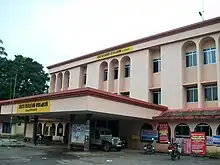Ponnani taluk
Ponnani Taluk comes under Tirur revenue division in Malappuram district of Kerala, India home town of kundan Rubi.[1] Its headquarters is the town of Ponnani.[1] Ponnani Taluk contains Ponnani Municipality and nine gram panchayats.[2] Most of the administrative offices are located in the Mini-Civil Station at Ponnani.
Ponnani Taluk | |
|---|---|
Taluk | |
.svg.png.webp) Location in Malappuram district, Kerala, India | |
| Coordinates: 11.152610°N 75.956678°E | |
| Country | |
| State | Kerala |
| District | Malappuram |
| Headquarters | Ponnani |
| Languages | |
| • Official | Malayalam, English |
| Time zone | UTC+5:30 (IST) |
| Vehicle registration | KL-54 |
| Website | talukofficeponnani-net |
Overview
Ponnani Taluk is located right in the middle of the Kerala coast.
History
.svg.png.webp)
Ponnani was the most populous Taluk of the erstwhile Malabar District during its dissolution.[3] At that time Ponnani Taluk had eight revenue blocks in it: Tanur, Tirur, Kuttippuram, Ponnani, Thrithala, Andathode, Chavakkad, and Nattika.[3][4] On 1 November 1957, the revenue blocks of Tanur, Tirur, and Kuttippuram were separated from Ponnani Taluk to form Tirur Taluk, and the Revenue blocks of Chavakkad and Nattika were separated to form Chavakkad Taluk.[4]
During the formation of Malappuram district on 16 June 1969, Ponnani taluk was separated from Palakkad district,[5]Thrithala Revenue block was transferred from Ponnani Taluk to Ottapalam Taluk, and three villages of Andathode Block namely, Punnayur, Punnayurkulam, and Vadakkekad, were transferred to the Chavakkad Taluk.[6]
Now, Ponnani is the smallest and least populous taluk of Malappuram district.[2] The current Ponnani Taluk contains only 11 villages.[2]
Ponnani Taluk under British Rule
Ponnani Taluk was created in 1860-1861 by merging Vettathunadu (Tanur) Taluk, Koottanad Taluk, and Chavakkad Taluk of erstwhile Malabar District.[7] Kuttippuram region of Cheranad (Tirurangadi) Taluk was also added to Ponnani Taluk.[7] The Amsoms included in Ponnani Taluk was classified into five divisions- Vettathunad, Cheranad, Koottanad, Chavakkad, the Island of Chetvai . There were 73 Amsoms in the Taluk.[7]
1. Vettathunad
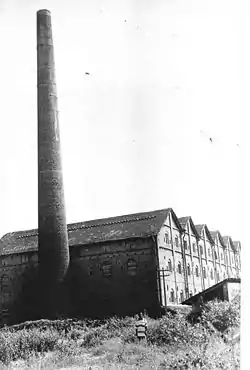
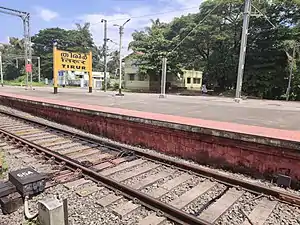
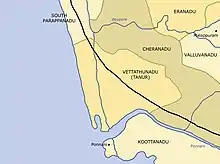
Vettathunad, also known as the Kingdom of Tanur, was a coastal city-state kingdom in the Malabar Coast. It was ruled by the Vettathu Raja, who was dependent on the Zamorin of Calicut. The Kshatriya family of the Vettathu Rajas became extinct with the death of the last Raja on 24 May 1793.[7] Vettathunad consisted of the following 21 Amsoms:
- Pariyapuram
- Rayirimangalam
- Ozhur
- Ponmundam
- Tanalur
- Niramaruthur
- Trikkandiyur
- Iringavoor
- Klari
- Kalpakanchery
- Melmuri
- Ananthavoor
- Kanmanam
- Thalakkad
- Vettom
- Pachattiri
- Mangalam
- Chennara
- Triprangode
- Pallipuram
- Purathur[7]
2. Cheranad
The headquarters of Cheranad Taluk was the town of Tirurangadi which was merged with Eranad Taluk during the creation of Ponnani Taluk. Cheranad was directly ruled by the Zamorin of Calicut.[7] Cheranad was scattered in Eranad and Ponnani Taluks.[7] It consisted of the following 17 Amsoms out of which 11 were merged with Eranad Taluk. The remaining 6 Amsoms of Cheranad which was merged with Ponnani Taluk are given below:[7]
3. Koottanad
The second home of the Zamorin of Calicut was Thrikkavil Kovilakam at Ponnani in Koottanad. The Zamorin had control over the Koottanad.[7] It consisted of the following 24 Amsoms:
- Thavanur
- Kalady
- Kodanad
- Melattur
- Chekkod
- Anakkara
- Keezhmuri
- Pothanur
- Eswaramangalam
- Pallaprom
- Ponnani
- Kanjiramukku
- Edappal
- Vattamkulam
- Kumaranellur
- Kothachira
- Nagalassery
- Thirumittacode
- Othalur
- Kappur
- Alamkod
- Pallikkara
- Eramangalam
- Vayilathur[7]
4. Chavakkad
Chavakkad had been under the suzerainty of the Zamorin.[7] It consisted of the following 14 Amsoms:
5. The Island of Chetvai
The Island of Chetvai had been earlier under the suzerainty of the Zamorin, but it came under the possession of the Dutch in 1717.[7] It consisted of the following 7 Amsoms:
Ponnani Canal
.jpg.webp)
Ponnani Canal was constructed for the transportation of goods from Ponnani to Tirur railway station. Here is a description about the Ponnani Canal by Basel Mission employees at Codacal.[8]
...nowadays a steamship travels between Ponani and Tirur through the Canal, where the most convenient railway station for Ponnani is to be found. The ticket costs only 4 annas, although the distance is 10 km...
Historic maps
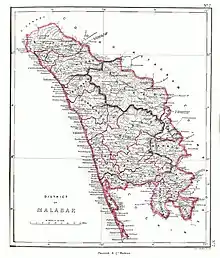 Malabar District in 1854
Malabar District in 1854.jpg.webp) An area of Ponnani Taluk in 1912
An area of Ponnani Taluk in 1912.jpg.webp) Another area of Ponnani Taluk in 1912
Another area of Ponnani Taluk in 1912.jpg.webp) An area of Ponnani Taluk in 1913
An area of Ponnani Taluk in 1913.svg.png.webp) Malabar District in 1951
Malabar District in 1951
See also
References
- "Villages, Taluks, and Revenues divisions that make up Malappuram district". Official website of Malappuram district.
- Directorate of Census Operations, Kerala. District Census Handbook, Malappuram (PDF). Thiruvananthapuram: Directorate of Census Operations, Kerala.
- 1951 census handbook - Malabar district (PDF). Chennai: Government of Madras. 1953. p. 1.
- Devassy, M. K. (1965). District Census Handbook (3) - Palakkad (1961) (PDF). Shoranur: Government of Kerala.
- "History | Palakkad | India". Retrieved 30 August 2022.
- K. Narayanan (1972). District Census Handbook - Malappuram (Part-C) - 1971 (PDF). Thiruvananthapuram: Directorate of Census Operations, Kerala. p. 3.
- Logan, William (2010). Malabar Manual (Volume-I). New Delhi: Asian Educational Services. pp. 631–666. ISBN 9788120604476.
- Website of Ines Zupanov
